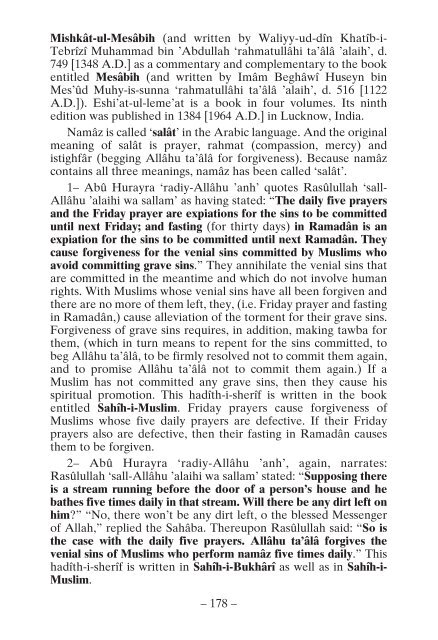Miftah-ul-Janna (Booklet for way to Paradise)
You also want an ePaper? Increase the reach of your titles
YUMPU automatically turns print PDFs into web optimized ePapers that Google loves.
Mishkât-<strong>ul</strong>-Mesâbih (and written by Waliyy-ud-dîn Khatîb-i-<br />
Tebrîzî Muhammad bin ’Abd<strong>ul</strong>lah ‘rahmat<strong>ul</strong>lâhi ta’âlâ ’alaih’, d.<br />
749 [1348 A.D.] as a commentary and complementary <strong>to</strong> the book<br />
entitled Mesâbih (and written by Imâm Beghâwî Huseyn bin<br />
Mes’ûd Muhy-is-sunna ‘rahmat<strong>ul</strong>lâhi ta’âlâ ’alaih’, d. 516 [1122<br />
A.D.]). Eshi’at-<strong>ul</strong>-leme’at is a book in four volumes. Its ninth<br />
edition was published in 1384 [1964 A.D.] in Lucknow, India.<br />
Namâz is called ‘salât’ in the Arabic language. And the original<br />
meaning of salât is prayer, rahmat (compassion, mercy) and<br />
istighfâr (begging Allâhu ta’âlâ <strong>for</strong> <strong>for</strong>giveness). Because namâz<br />
contains all three meanings, namâz has been called ‘salât’.<br />
1– Abû Hurayra ‘radiy-Allâhu ’anh’ quotes Rasûl<strong>ul</strong>lah ‘sall-<br />
Allâhu ’alaihi wa sallam’ as having stated: “The daily five prayers<br />
and the Friday prayer are expiations <strong>for</strong> the sins <strong>to</strong> be committed<br />
until next Friday; and fasting (<strong>for</strong> thirty days) in Ramadân is an<br />
expiation <strong>for</strong> the sins <strong>to</strong> be committed until next Ramadân. They<br />
cause <strong>for</strong>giveness <strong>for</strong> the venial sins committed by Muslims who<br />
avoid committing grave sins.” They annihilate the venial sins that<br />
are committed in the meantime and which do not involve human<br />
rights. With Muslims whose venial sins have all been <strong>for</strong>given and<br />
there are no more of them left, they, (i.e. Friday prayer and fasting<br />
in Ramadân,) cause alleviation of the <strong>to</strong>rment <strong>for</strong> their grave sins.<br />
Forgiveness of grave sins requires, in addition, making tawba <strong>for</strong><br />
them, (which in turn means <strong>to</strong> repent <strong>for</strong> the sins committed, <strong>to</strong><br />
beg Allâhu ta’âlâ, <strong>to</strong> be firmly resolved not <strong>to</strong> commit them again,<br />
and <strong>to</strong> promise Allâhu ta’âlâ not <strong>to</strong> commit them again.) If a<br />
Muslim has not committed any grave sins, then they cause his<br />
spiritual promotion. This hadîth-i-sherîf is written in the book<br />
entitled Sahîh-i-Muslim. Friday prayers cause <strong>for</strong>giveness of<br />
Muslims whose five daily prayers are defective. If their Friday<br />
prayers also are defective, then their fasting in Ramadân causes<br />
them <strong>to</strong> be <strong>for</strong>given.<br />
2– Abû Hurayra ‘radiy-Allâhu ’anh’, again, narrates:<br />
Rasûl<strong>ul</strong>lah ‘sall-Allâhu ’alaihi wa sallam’ stated: “Supposing there<br />
is a stream running be<strong>for</strong>e the door of a person’s house and he<br />
bathes five times daily in that stream. Will there be any dirt left on<br />
him?” “No, there won’t be any dirt left, o the blessed Messenger<br />
of Allah,” replied the Sahâba. Thereupon Rasûl<strong>ul</strong>lah said: “So is<br />
the case with the daily five prayers. Allâhu ta’âlâ <strong>for</strong>gives the<br />
venial sins of Muslims who per<strong>for</strong>m namâz five times daily.” This<br />
hadîth-i-sherîf is written in Sahîh-i-Bukhârî as well as in Sahîh-i-<br />
Muslim.<br />
– 178 –

















